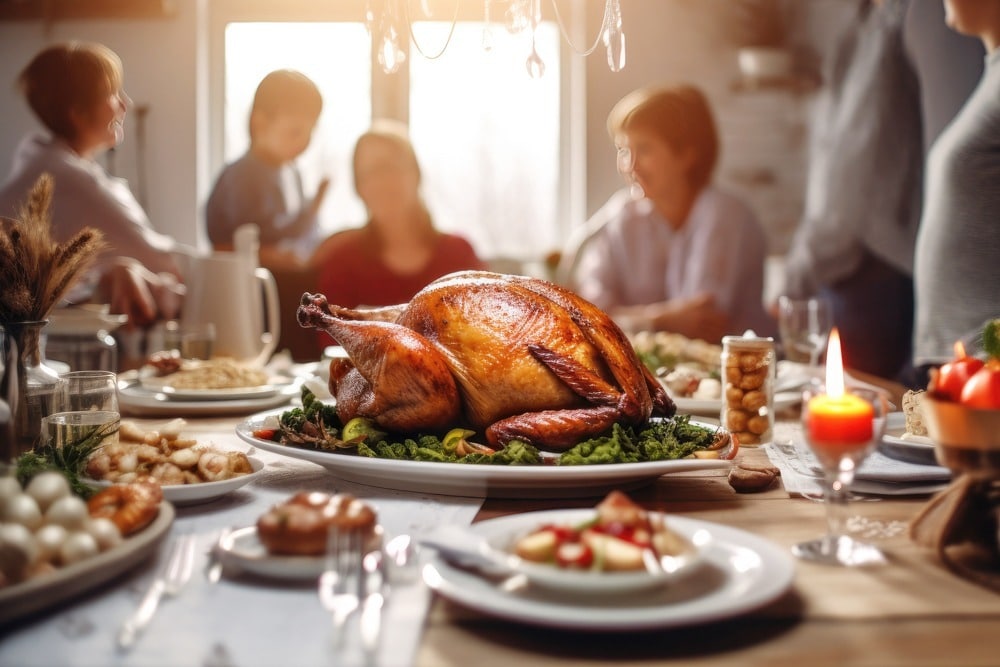Thanksgiving is a time for connection, gratitude, and celebration. But for those in recovery or choosing a sober lifestyle, it can also be a challenging holiday. From alcohol-centric traditions to triggering social situations, the prevalence of alcohol abuse during events like Thanksgiving makes maintaining sobriety particularly difficult.
Staying sober during Thanksgiving requires thoughtful preparation and support. Addiction treatment services play a crucial role in providing the necessary resources and supportive environments for individuals struggling with substance use issues.
Table of Contents
ToggleWhy Celebrating Your First Sober Thanksgiving Matters
For many, alcohol is a staple of Thanksgiving festivities, from toasts to wine pairings with dinner. Choosing to celebrate Thanksgiving sober represents a powerful commitment to your health and recovery. Embracing a healthy life is crucial in the context of recovery from addiction, as it provides the necessary tools to achieve sobriety and improve overall well-being.
A sober Thanksgiving allows you to be fully present with loved ones, create meaningful memories, and honor your journey toward a healthier lifestyle. It’s an opportunity to redefine the holiday as one of authentic gratitude and connection, free from the influence of alcohol.
Preparing for Your First Sober Thanksgiving
Preparing for your first sober Thanksgiving can feel overwhelming, but with the right mindset and preparation, you can navigate this special day with confidence and grace. Here are some tips to help you get ready:
- Set Realistic Expectations: Understand that your first sober Thanksgiving may not be perfect, and that’s perfectly okay.
- Communicate with Family Members: Let your family members know about your decision to stay sober and ask for their support. Open communication can help reduce stress and anxiety, making the day more enjoyable for everyone.
- Plan Ahead: Think about the scenarios you might encounter and how you will handle them. Have a plan in place for managing triggers and cravings. Whether it’s bringing your own non-alcoholic beverages or having a trusted friend on speed dial, preparation is key.
- Find a Sober Friend or Support Group: Having a supportive friend or a support group can make a big difference in your sobriety journey. Reach out to them for guidance and encouragement. Knowing you have someone to lean on can provide immense comfort.
- Focus on Gratitude: Thanksgiving is a time for gratitude, so focus on the things you’re thankful for. This can help shift your focus away from alcohol. Reflect on your progress and the support you’ve received along the way.
By following these tips, you can navigate your first sober Thanksgiving with confidence and maintain your sobriety throughout the holiday season. Remember, recovery is a journey, and it’s okay to take things one day at a time.
Preparing for Social Situations Without Alcohol
Social gatherings can be a minefield of temptation, especially when alcohol is readily available. Preparing in advance can help you navigate these situations with confidence.
- Bring Your Own Beverages: Stock up on non-alcoholic drinks like sparkling water, mocktails, or cider. Bringing a non-alcoholic beverage to social gatherings is important as it helps prevent unwanted attention and awkward questions about not drinking. Having your own options also ensures you’ll never feel left out during toasts or dinner.
- Rehearse Your Responses: Anticipate situations where you may be offered alcohol and prepare a polite yet firm response, such as, “I’m good with what I have, thanks.”
- Enlist a Buddy: If possible, attend the gathering with a supportive friend or family member who understands your sobriety and can help keep you accountable.
Tips for Managing Triggers and Cravings
Holiday stress, certain foods, or even specific people can be triggers for alcohol cravings and can be particularly challenging for those dealing with alcohol addiction. To manage these effectively:
- Identify Your Triggers: Reflect on past holidays and note what situations made you want to drink.
- Practice Mindfulness: Ground yourself in the present moment through deep breathing, meditation, or focusing on sensory details around you.
- Have an Exit Plan: Give yourself permission to leave a gathering if you feel overwhelmed or triggered.
If cravings arise, remind yourself of why you chose sobriety and consider reaching out to a trusted friend or sponsor for support. Remember, the recovery journey is continuous. Resilience is key to overcoming setbacks and celebrating milestones like your first sober Thanksgiving.
Creating a Supportive Thanksgiving Environment for Family Members
Hosting Thanksgiving yourself or collaborating with like-minded individuals can help you create a safe, supportive environment for a sober life.
- Set a Clear Tone: Let guests know in advance that the celebration will be alcohol-free (or even BYOB). Phrase it positively, emphasizing the focus on food, fun, and connection.
- Curate the Guest List: Invite people who understand and respect your sobriety.
- Decor and Ambiance: Create a warm, inviting space with music, candles, and seasonal decorations to enhance the festive atmosphere without the need for alcohol.
Practicing Self-Care During the Holidays

Practicing self-care during the holidays is crucial for maintaining your sobriety and overall well-being. Here are some tips to help you prioritize self-care during the holiday season:
- Take Care of Your Physical Health: Regular exercise, healthy eating, and sufficient sleep can help reduce stress and anxiety. Keeping your body healthy supports your mental health and makes it easier to stay committed to your sobriety journey.
- Engage in Healthy Coping Mechanisms: Activities like meditation, yoga, or journaling can help you manage stress and cravings. These practices can provide a sense of calm and help you stay centered during the holiday hustle and bustle.
- Set Boundaries: Learn to say “no” to situations that may trigger stress or anxiety. Prioritize your recovery and take care of yourself. It’s okay to step away from conversations or gatherings that feel overwhelming.
- Seek Support: Reach out to a supportive friend, family member, or support group for guidance and encouragement. Having a network of understanding individuals can provide the strength and reassurance you need.
- Practice Mindfulness: Focus on the present moment and let go of worries about the past or future. Mindfulness can help you stay grounded and focused on your sobriety journey. Simple practices like deep breathing or mindful walking can make a big difference.
By following these self-care tips, you can navigate the holiday season with confidence and maintain your sobriety. Your well-being comes first, and it’s okay to take things one day at a time.
Planning Alcohol-Free Activities and Traditions
Reimagining Thanksgiving traditions can make the holiday more enjoyable without alcohol. Managing sobriety during festive gatherings can be challenging due to potential temptations. Being prepared and reminding oneself of personal motivations for maintaining sobriety is crucial.
Here are some ideas for alcohol-free activities and traditions:
- Host a Game Night: Bring out board games, trivia, or strategy games for a night of laughter and bonding.
- Cook Together: Make preparing the Thanksgiving meal a group activity. Sharing recipes and cooking together can be a fun and engaging way to connect.
- Take a Gratitude Walk: After dinner, go for a walk to enjoy the crisp fall air and reflect on what you’re thankful for.
These activities not only keep the focus off alcohol but also allow for deeper connections with loved ones.
How to Handle Questions About Sobriety
Inevitably, someone may ask why you’re not drinking. How you respond depends on your comfort level:
- Keep It Simple: A straightforward “I’m choosing not to drink” is often enough.
- Redirect the Conversation: Shift the focus by asking about the person’s holiday plans or hobbies.
- Be Honest: If you’re comfortable, share that you’re focusing on health or recovery from alcohol addiction. This honesty can sometimes inspire others.
Remember, you are not obligated to justify your choices. Protecting your sobriety is your priority.
Practicing Gratitude as Part of Your Recovery Journey
Thanksgiving naturally lends itself to thinking about gratitude, which is a cornerstone of recovery. Use this time to reflect on what you’re thankful for:
- Start a Gratitude Journal: Write down three things you’re grateful for each day leading up to Thanksgiving.
- Share Gratitude with Others: During dinner, suggest going around the table and sharing one thing each person is thankful for.
- Focus on Progress: Celebrate how far you’ve come in your sobriety journey and the support you’ve received along the way.
- Think About Your Support System: Having sober friends as part of your support system can be crucial during challenging times, so take a moment to appreciate their presence and discuss any plans or past issues with them to ensure readiness for potential difficulties.
Gratitude helps shift the focus from what’s missing to what’s present, fostering a more positive mindset.
Setting Boundaries for a Stress-Free Holiday Season

Setting boundaries is essential for protecting your sobriety during the holidays. Consider the following:
- Limit Time with Difficult People: If certain individuals are triggering, plan to spend limited time around them or avoid them altogether.
- Say No When Necessary: It’s okay to decline invitations or step away from conversations that feel overwhelming.
- Prioritize Self-Care: Schedule downtime before and after events to recharge emotionally and physically.
Boundaries ensure that you’re celebrating the holiday on your terms, in a way that supports your well-being.
Building a Support System for Thanksgiving
A strong support system is invaluable during the holidays. Here’s how to build yours:
- Reach Out Early: Let friends, family, or sponsors know you may need extra support during Thanksgiving.
- Attend Support Meetings: Many recovery groups offer holiday-themed meetings where you can connect with others navigating similar challenges.
- Stay Connected: Keep your phone nearby and don’t hesitate to call or text someone if you need encouragement.
Surrounding yourself with understanding and supportive individuals can make all the difference in maintaining your sobriety.
Making New Thanksgiving Traditions in Sobriety
Sobriety is an opportunity to create new, meaningful traditions. Some ideas include:
- Volunteering: Spend the day serving at a local shelter or participating in a community event.
- Creating a Memory Book: Commemorate each Thanksgiving with photos, quotes, and memories to look back on over the years.
- Hosting a Movie Marathon: Choose a theme or genre and make it an annual tradition.
These new traditions can transform Thanksgiving into a holiday that aligns with your values and sobriety goals.
Seeking Additional Support at Agape Treatment
For those who find the holidays particularly challenging, professional support can provide guidance and tools for staying sober. At Agape Treatment Center, we understand the unique pressures that holidays like Thanksgiving can bring. Our comprehensive programs are designed to support individuals in recovery with a focus on holistic care, including therapy, group counseling, and aftercare planning.
Thanksgiving can be a time of healing, connection, and gratitude—Agape Treatment Center is here to help you every step of the way. If you or a loved one are seeking additional support this holiday season, don’t hesitate to contact us today.

Stephanie Robilio is an accomplished Clinical Director at Agape Behavioral Healthcare. With a Master of Social Work degree, LCSW license, and extensive training in Rapid Resolution Therapy under her belt, she brings a wealth of expertise to her role. Her unique combination of education and experience allows her to provide exceptional care to clients and lead her team with confidence. Stephanie’s joy comes from witnessing the moments when her patients creatively connect the dots and bravely move toward reclaiming their power. Her purpose is to help individuals understand their past so they can create a future full of hope, growth, and success. Stephanie attributes a large portion of her success to the supportive culture and strong sense of community fostered by the Agape team.







